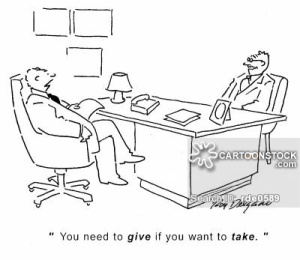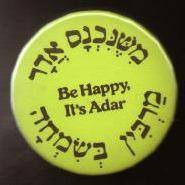This week’s post is taken from one of my favorite essays by R. Mordechai Kamenetzky on the portion of Terumah that you can find in it’s entirety here combined with something I wrote about the month of Adar a few years ago on Israel National News.
After an entire portion filled with commandments regarding man’s obligation toward his fellow man, in this week’s portion of Terumah the Torah focuses on a very spiritual aspect of our existence. God commands His nation to build a Tabernacle in which He would figuratively dwell. Thus the Torah begins this week’s portion with a mainstay of Jewish life — the appeal.
The Torah instructs the Jewish nation to contribute gold, silver, and an array of other materials to the great cause of erecting and furnishing a Mishkan (Tabernacle). However the appeal is worded very strangely. God does not ask the people to give; he asks them to take: “Speak to the children of Israel and let them take a portion for me.” (Exodus 25:2)
The question is obvious. Why does the Torah tell the people to take a portion when in essence they are giving a portion? What is the message behind the semantic anomaly?
Max and Irving went fishing on an overcast afternoon. About two hours into their expedition a fierce storm developed. Their small rowboat tossed and tossed and finally flipped over into the middle of the lake. Max, a strong swimmer, called to save Irving, but to no avail. Irving did not respond to any plea and unfortunately drowned. Max swam to shore to break the terrible news to Irving’s poor wife.
“What happened?” she screamed. “Tell me the whole story!”
Max recounted the entire episode in full detail.
“But what did you do to try to save my Irving?” she shrieked. Max explained once again. “I kept screaming to your husband, ‘Irving, give me your hand — give me your hand — Give me your hand! But Irving just gave me a blank stare and drifted away.”
“You fool!” shouted the widow. “You said the wrong thing. You should have said, ‘take my hand.’ Irving never gave anything to anybody!”.
We often make the same mistake that Irving made. When we hear the word “give” we recoil. In its first solicitation, the Torah is teaching us a lesson. When you give with true heart, you are not giving anything away. You are taking a share for yourself. Materialistic pleasures in which many people indulge are eventually digested and forgotten. The new cars become old ones, the glorious homes fall to disrepair, and the newest gizmos and gadgets become outdated. The only items that remain are those that we give. They remain in a storehouse of merits and eventually will repay us and our descendants. The Montefiores and the Rothschilds are not forever cherished for opulence and indulgence. They are remembered for their great benevolence and charity. They not only gave for eternity. They received for eternity as well.

I could (and maybe should) end my post right here, but there is one more thought I want to share as today is the first day of the month of Adar.
For as long as he lives, Bobby McFerrin, the noted American vocalist, conductor, and ten-time Grammy Award winner, will be remembered for one specific song. This point was proven to me back about twenty years ago, when I served as a counselor for a group of Jewish high school students from Los Angeles on their two month visit to Israel.
We had given the group some free time along the Ben-Yehuda Street pedestrian mall in Jerusalem, and I, along with the group organizer’s daughter, walked up towards the top of the street to get away from the LA teens for a bit. As we strolled by one of the fancy jewelry/Judaica shops, we could not help but notice the slim, dreadlocked, African-American gentleman examining the merchandise.
My companion showed no fear as she immediately entered the store and boldly approached him.
“‘Don’t Worry, Be Happy.’ Right?” she bluntly asked.
McFerrin turned, smiled, nodded, and graciously gave her an autograph. Although this scene had surely played out before him thousands of times in the past, he must have been surprised that it happened in Jerusalem of all places, where he was scheduled to be the guest conductor of the Israel Philharmonic that evening.
Here’s a nice reminder of his hit song (all sounds are made by Bobby without any musical instruments, and yes that is the late great Robin Williams in the music video with him):
I got to thinking about that song title as the month of Adar commences this week. During this period, in the two weeks between the start of Adar and through the holiday of Purim, people customarily cite – or sing – the famous Talmudic adage, “Mi-she’nikhnas Adar marbim be-simcha” – “When Adar arrives, we increase joy.” It makes sense, as Purim is a very joyful holiday.

But do the two phrases go together? Does Judaism require, especially during the merry month of Adar, that we ‘don’t worry, be happy’? I always thought worrying was the Jewish national pastime, sort of like baseball, but with more guilt. How can we Jews, as a people, not worry? It’s unnatural!
And what about Rabbi Nachman of Breslev who is quoted as having said: “Mitzvah gedolah le’hiyot besimcha tamid.” “It is a great mitzvah to always be happy.” From this it seems like we should always be happy, but be ‘extra’ happy in Adar. Is that it?
I think the key to understanding the phrase about Adar requires looking back at the original statement in the Talmud. The full text of the passage, in Tractate Ta’anit (29a), reads as follows: “Rabbi Yehuda the son of Rav Shemuel Bar Sheilat said in the name of Rav: Just as when Av arrives we decrease our joy, so, too, when Adar arrives, we increase our joy.”
Notice that at onset of the month of Av, when we mark the saddest day of the Jewish calendar, the 9th of Av, on which the 1st and 2nd temples in Jerusalem were destroyed, we do not cease in joy altogether, we simply decrease the level of it, just like we increase the joy factor in Adar.
Apparently, we always need to go through life with some level of joy in our hearts. Sometimes it is held in check (at the beginning of Av) and sometimes we are advised to crank it up (in Adar).
But still, how can we all be happy all the time? Is the musical remedy “…but don’t worry, be happy!” all there is to it? Is it that simple?
What prevents a person from rejoicing in life? Only the feeling that he or she is missing something. Indeed, being happy is not really about how much we actually have, it is rather about appreciating how much we have. It is only through appreciation that we really have things at all. As Ben Zoma said: Who is rich? One who appreciates what he has…” (Talmud- Avot 4:1)
One might conclude that that’s enough. If I truly appreciate what I have, then I will be happy, and then I won’t have to worry.
But that’s just what sets the Jewish people apart. It’s that we do worry. We worry about peace and security in Israel, we worry about the economy, and, we worry (or should worry) about each other. “Kol Yisrael areivim zeh ba-zeh”—“All Jews are responsible for each other”. Yes, we worry!
So with all due respect to Bobby McFerrin, we cannot, even during the joyful month of Adar, not worry at all. You see, it’s in our genes to worry. But, we’ll try to keep it in check and boost the joy level.
And if you’ll allow me to tie it back in with the first half of the post, maybe the key to being happy is not to ‘take’ but to ‘give’. Give of yourself and it will all come back to you many times over.
That’s not to say we shouldn’t worry about some things, we should. But be a ‘giver’ and as a result of giving of ourselves maybe our motto for Adar should be changed to: ‘Don’t Worry So Much. Be Happier!’

After an entire portion filled with commandments regarding man’s obligation toward his fellow man, in this week’s portion of Terumah the Torah focuses on a very spiritual aspect of our existence. God commands His nation to build a Tabernacle in which He would figuratively dwell. Thus the Torah begins this week’s portion with a mainstay of Jewish life — the appeal.
The Torah instructs the Jewish nation to contribute gold, silver, and an array of other materials to the great cause of erecting and furnishing a Mishkan (Tabernacle). However the appeal is worded very strangely. God does not ask the people to give; he asks them to take: “Speak to the children of Israel and let them take a portion for me.” (Exodus 25:2)
The question is obvious. Why does the Torah tell the people to take a portion when in essence they are giving a portion? What is the message behind the semantic anomaly?
Max and Irving went fishing on an overcast afternoon. About two hours into their expedition a fierce storm developed. Their small rowboat tossed and tossed and finally flipped over into the middle of the lake. Max, a strong swimmer, called to save Irving, but to no avail. Irving did not respond to any plea and unfortunately drowned. Max swam to shore to break the terrible news to Irving’s poor wife.
“What happened?” she screamed. “Tell me the whole story!”
Max recounted the entire episode in full detail.
“But what did you do to try to save my Irving?” she shrieked. Max explained once again. “I kept screaming to your husband, ‘Irving, give me your hand — give me your hand — Give me your hand! But Irving just gave me a blank stare and drifted away.”
“You fool!” shouted the widow. “You said the wrong thing. You should have said, ‘take my hand.’ Irving never gave anything to anybody!”.
We often make the same mistake that Irving made. When we hear the word “give” we recoil. In its first solicitation, the Torah is teaching us a lesson. When you give with true heart, you are not giving anything away. You are taking a share for yourself. Materialistic pleasures in which many people indulge are eventually digested and forgotten. The new cars become old ones, the glorious homes fall to disrepair, and the newest gizmos and gadgets become outdated. The only items that remain are those that we give. They remain in a storehouse of merits and eventually will repay us and our descendants. The Montefiores and the Rothschilds are not forever cherished for opulence and indulgence. They are remembered for their great benevolence and charity. They not only gave for eternity. They received for eternity as well.

I could (and maybe should) end my post right here, but there is one more thought I want to share as today is the first day of the month of Adar.
For as long as he lives, Bobby McFerrin, the noted American vocalist, conductor, and ten-time Grammy Award winner, will be remembered for one specific song. This point was proven to me back about twenty years ago, when I served as a counselor for a group of Jewish high school students from Los Angeles on their two month visit to Israel.
We had given the group some free time along the Ben-Yehuda Street pedestrian mall in Jerusalem, and I, along with the group organizer’s daughter, walked up towards the top of the street to get away from the LA teens for a bit. As we strolled by one of the fancy jewelry/Judaica shops, we could not help but notice the slim, dreadlocked, African-American gentleman examining the merchandise.
My companion showed no fear as she immediately entered the store and boldly approached him.
“‘Don’t Worry, Be Happy.’ Right?” she bluntly asked.
McFerrin turned, smiled, nodded, and graciously gave her an autograph. Although this scene had surely played out before him thousands of times in the past, he must have been surprised that it happened in Jerusalem of all places, where he was scheduled to be the guest conductor of the Israel Philharmonic that evening.
Here’s a nice reminder of his hit song (all sounds are made by Bobby without any musical instruments, and yes that is the late great Robin Williams in the music video with him):
I got to thinking about that song title as the month of Adar commences this week. During this period, in the two weeks between the start of Adar and through the holiday of Purim, people customarily cite – or sing – the famous Talmudic adage, “Mi-she’nikhnas Adar marbim be-simcha” – “When Adar arrives, we increase joy.” It makes sense, as Purim is a very joyful holiday.

But do the two phrases go together? Does Judaism require, especially during the merry month of Adar, that we ‘don’t worry, be happy’? I always thought worrying was the Jewish national pastime, sort of like baseball, but with more guilt. How can we Jews, as a people, not worry? It’s unnatural!
And what about Rabbi Nachman of Breslev who is quoted as having said: “Mitzvah gedolah le’hiyot besimcha tamid.” “It is a great mitzvah to always be happy.” From this it seems like we should always be happy, but be ‘extra’ happy in Adar. Is that it?
I think the key to understanding the phrase about Adar requires looking back at the original statement in the Talmud. The full text of the passage, in Tractate Ta’anit (29a), reads as follows: “Rabbi Yehuda the son of Rav Shemuel Bar Sheilat said in the name of Rav: Just as when Av arrives we decrease our joy, so, too, when Adar arrives, we increase our joy.”
Notice that at onset of the month of Av, when we mark the saddest day of the Jewish calendar, the 9th of Av, on which the 1st and 2nd temples in Jerusalem were destroyed, we do not cease in joy altogether, we simply decrease the level of it, just like we increase the joy factor in Adar.
Apparently, we always need to go through life with some level of joy in our hearts. Sometimes it is held in check (at the beginning of Av) and sometimes we are advised to crank it up (in Adar).
But still, how can we all be happy all the time? Is the musical remedy “…but don’t worry, be happy!” all there is to it? Is it that simple?
What prevents a person from rejoicing in life? Only the feeling that he or she is missing something. Indeed, being happy is not really about how much we actually have, it is rather about appreciating how much we have. It is only through appreciation that we really have things at all. As Ben Zoma said: Who is rich? One who appreciates what he has…” (Talmud- Avot 4:1)
One might conclude that that’s enough. If I truly appreciate what I have, then I will be happy, and then I won’t have to worry.
But that’s just what sets the Jewish people apart. It’s that we do worry. We worry about peace and security in Israel, we worry about the economy, and, we worry (or should worry) about each other. “Kol Yisrael areivim zeh ba-zeh”—“All Jews are responsible for each other”. Yes, we worry!
So with all due respect to Bobby McFerrin, we cannot, even during the joyful month of Adar, not worry at all. You see, it’s in our genes to worry. But, we’ll try to keep it in check and boost the joy level.
And if you’ll allow me to tie it back in with the first half of the post, maybe the key to being happy is not to ‘take’ but to ‘give’. Give of yourself and it will all come back to you many times over.
That’s not to say we shouldn’t worry about some things, we should. But be a ‘giver’ and as a result of giving of ourselves maybe our motto for Adar should be changed to: ‘Don’t Worry So Much. Be Happier!’
